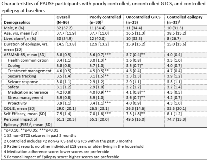Poorer Epilepsy Self-Management Skills Are Present in Those Who Most Need Good Seizure Control: PAUSE to Learn Your Epilepsy
Abstract number :
3.422
Submission category :
13. Health Services (Delivery of Care, Access to Care, Health Care Models)
Year :
2018
Submission ID :
502154
Source :
www.aesnet.org
Presentation date :
12/3/2018 1:55:12 PM
Published date :
Nov 5, 2018, 18:00 PM
Authors :
Dilip Pandey, University of Illinois at Chicago; Katharine Ozenberger, University of Illinois at Chicago; Jessica Levy, University of Illinois at Chicago; Mitra Habibi, University of Illinois at Chicago; Woojin Song, University of Illinois at Chicago; Pat
Rationale: Almost 40% of people with epilepsy (PWE) report recurring seizures despite being on anti-epileptic drugs. Recurring seizures increase the risk of hospitalizations, depression, and death. Specifically, uncontrolled or frequent seizures and generalized tonic-clonic seizures (GTCS) have been reported as risk factors for Sudden Unexpected Death in Epilepsy (SUDEP). Many of the steps to control seizures among PWE align with self-management behaviors that focus on building skills to reduce the impact epilepsy and improve seizure control. Here, we compared self-management skills in poorly and uncontrolled GTCS patients to those with well-controlled epilepsy. Methods: The PAUSE study evaluates the effectiveness of personalized self-management education using mobile technology on improving the lives of adult PWE from underserved populations. Data from study participants (N= 86) who completed self-reported study questionnaires at baseline were included in the analysis. Self-management skills were assessed using the epilepsy self-management practice (AESMMI-65) questionnaire. PWE reporting =2 partial seizures within the last 3 months were characterized as poorly controlled. The well-controlled seizure group included those PWE reporting no seizures or 1 partial seizure in past 3 months. Uncontrolled GTCS (=1 GTCS in past 3 months) was examined as a separate group because of its increased risk for SUDEP. Descriptive statistics included chi-square statistics or t-test, as appropriate. Results: Overall, the mean age was 37.7 (std. dev 11.9) years, 62.8 % were female, and 46.5 % were non-Hispanic black. The mean AESMMI score was significantly lower in the poorly controlled epilepsy group and in the uncontrolled GTCS, indicating PWE with poorly controlled epilepsy or uncontrolled GTCS are poorer self-managers of their epilepsy. PWE with poorly controlled epilepsy had the lowest health communication, treatment management, seizure tracking, and proactivity skills in managing their seizures. PWE with poorly controlled epilepsy had significantly lower self-efficacy in self-managing epilepsy. Conclusions: Our findings are highly significant as they identify that sub-groups of PWE at increased risk of hospitalizations, depression, and SUDEP have poorer epilepsy self-management skills and behaviors. It underscores the need for additional resources and support for targeted self-management education tailored for these sub-groups. Funding: PAUSE is a project supported by the University of Illinois Prevention Research Center and the Centers for Disease Control and Prevention's MEW Network. The project is administered by the Institute for Health Research and Policy of the University of Illinois at Chicago, under CDC cooperative agreement no. U48-DP005010.
